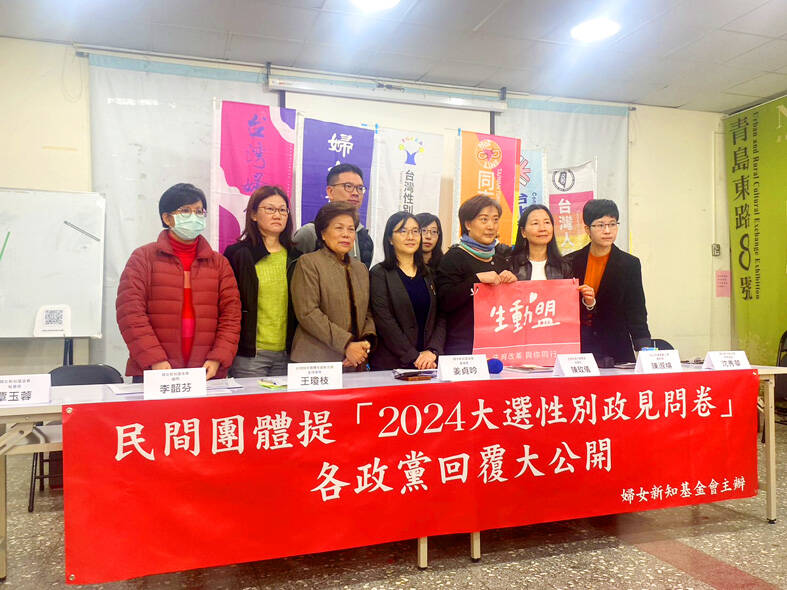A coalition of 28 civic groups yesterday criticized the “disappointing” and indirect responses it received to a gender-equality policy questionnaire from the nation’s major political parties.
The Awakening Foundation, the National Alliance of Taiwan Women’s Associations and other groups early last month submitted the nine-point questionnaire to eight political parties.
The Democratic Progressive Party’s (DPP) response mainly addressed expansions to its current policies, while the Chinese Nationalist Party’s (KMT) and Taiwan People’s Party’s (TPP) proposals, on the whole, pose an inadequate challenge to the ruling party, Awakening Foundation chairwoman Chiang Chen-yin (姜貞吟) said.

Photo: CNA
Regarding salaries and work-life balance, the DPP promised to offer more flexible parental leave, paid family care and long-term care leave, and extend the length of paid maternity leave, the groups said.
However, it did not offer specifics on those plans, and did not provide a proposal for reducing overall working hours, they said.
In Taiwan, new mothers can take eight weeks of maternity leave at 100 percent of their insured monthly salary, while new mothers and fathers can take six months of parental leave at 80 percent of their salary before their child turns three.
The government does not guarantee paid family care leave or long-term care leave.
The KMT promised in the survey to offer three-and-a-half days of annual paid family care leave, while the TPP pledged to “increase” family care leave, without specifying the number of days or whether they would be paid, the groups said.
Regarding day care access, the DPP put forth a plan to increase the number of quasi-public and community childcare centers, while the TPP and KMT focused mainly on increasing childcare-related subsidies, Chiang said.
None of the three major parties offered concrete plans to reduce the urban-rural gap in access to childcare, she said.
Regarding a labor shortage at long-term care centers, only the KMT pledged to integrate migrant workers into the system, by gradually allowing government-contracted nursing homes to hire foreign caregivers, Awakening Foundation consultant Lee Shao-fen (李韶芬) said.
In contrast, the DPP focused on finding ways for people caring for elderly family members to continue working, while the TPP proposed expanding direct hiring of home-based foreign caregivers and increasing transparency among labor brokers, Lee said.
The New Power Party, the Taiwan Statebuilding Party, the People First Party, the Taiwan Obasang Political Equality Party and the Green Party also responded to the questionnaires, the groups said.

The first global hotel Keys Selection by the Michelin Guide includes four hotels in Taiwan, Michelin announced yesterday. All four received the “Michelin One Key,” indicating guests are to experience a “very special stay” at any of the locations as the establishments are “a true gem with personality. Service always goes the extra mile, and the hotel provides much more than others in its price range.” Of the four hotels, three are located in Taipei and one in Taichung. In Taipei, the One Key accolades were awarded to the Capella Taipei, Kimpton Da An Taipei and Mandarin Oriental Taipei. Capella Taipei was described by

EVA Airways today confirmed the death of a flight attendant on Saturday upon their return to Taiwan and said an internal investigation has been launched, as criticism mounted over a social media post accusing the airline of failing to offer sufficient employee protections. According to the post, the flight attendant complained of feeling sick on board a flight, but was unable to take sick leave or access medical care. The crew member allegedly did not receive assistance from the chief purser, who failed to heed their requests for medical attention or call an ambulance once the flight landed, the post said. As sick

The Taichung District Court yesterday confirmed its final ruling that the marriage between teenage heir Lai (賴) and a man surnamed Hsia (夏) was legally invalid, preventing Hsia from inheriting Lai’s NT$500 million (US$16.37 million) estate. The court confirmed that Hsia chose not to appeal the civil judgement after the court handed down its ruling in June, making the decision final. In the June ruling, the court said that Lai, 18, and Hsia, 26, showed “no mutual admiration before the marriage” and that their interactions were “distant and unfamiliar.” The judge concluded that the couple lacked the “true intention of

A drunk woman was sexually assaulted inside a crowded concourse of Taipei Railway Station on Thursday last week before a foreign tourist notified police, leading to calls for better education on bystander intervention and review of security infrastructure. The man, surnamed Chiu (邱), was taken into custody on charges of sexual assault, taking advantage of the woman’s condition and public indecency. Police discovered that Chiu was a fugitive with prior convictions for vehicle theft. He has been taken into custody and is to complete his unserved six-month sentence, police said. On Thursday last week, Chiu was seen wearing a white